Overview
- Credit Line
- United States Holocaust Memorial Museum Collection, Gift of Judy Gartner and Susan Oberfeld
Physical Details
- Classification
-
Decorative Arts
- Category
-
Handicrafts
- Object Type
-
Frames (furnishings) (aat)
- Dimensions
- overall: Height: 6.000 inches (15.24 cm) | Width: 4.000 inches (10.16 cm)
- Materials
- overall : wood, metal, cardboard
Rights & Restrictions
- Conditions on Access
- No restrictions on access
- Conditions on Use
- No restrictions on use
Administrative Notes
- Legal Status
- Permanent Collection
- Provenance
- The frame was donated to the United States Holocaust Memorial Museum in 2004 by Judy Gartner and Susan Oberfeld, the daughters of Carl and Mina Kaufmann Weiler.
- Record last modified:
- 2022-07-28 18:12:27
- This page:
- https://collections.ushmm.org/search/catalog/irn531921
Download & Licensing
In-Person Research
- By Appointment
- Request 21 Days in Advance of Visit
- Plan a Research Visit
- Request to See This Object
Contact Us
Also in Carl Weiler and Mina Kaufmann Weiler families collection
The collection consists of artifacts, correspondence, documents, an oral testimony, and photographs relating to the Mina Kaufmann and Carl Weiler families in Germany, Switzerland and the United States before World War II and in Germany and Gurs internment camp in France during the war.
Date: 1937 December
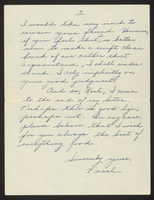
Carl and Mina Weiler papers
Document
The Carl and Mina Weiler papers consist of biographical materials, correspondence, emigration and immigration files, photographic materials, printed materials, and a recipe book documenting Carl Weiler’s and Mina Kaufmann’s German educations, American immigrations, and unsuccessful efforts to bring their family members to the United States. The collection also includes a World War I photo album and scrapbook documenting the military service of Mina’s uncle, Julius Oppenheimer, in Moselle. Biographical materials include birth, marriage, naturalization, and death certificates; passports and driver’s licenses; student and employment records; and letters of recommendation documenting Carl and Mina Weiler; family friends Max and Rosa Neumann, Max’s father Hirsch, and their housekeeper Lina Bach; Carl’s uncle Richard Ederheimer; and Mina’s relatives Frieda Allersheimer and Michael Kaufmann. This series also includes Julius Oppenheimer’s 1937 date book. Kaufmann family correspondence includes prewar and wartime letters among Mina Weiler, Klara Kaufmann, and their Oppenheimer relatives about Mina’s life in the United States, Klara’s deportation to Gurs, news of family members and friends, and efforts to immigrate to the United States. Wartime correspondence also includes letters from Mina’s friend Karl Mayer who was interned as a German national at Yercaud in India. Postwar letters among Mina, Karl Maier, and Josef Oppenheimer describe the Holocaust fates of relatives, efforts to recover family property, and continued efforts to immigrate. Letters from the Gemeindeverwaltung Gemmingen provide Oppenheimer family history and attempt to trace family members. Weiler family correspondence consists of prewar and wartime letters among Carl Weiler, his sister, his parents, his cousins Curt Weiler and Emil Stern, and family friend Richard Auerbach about Karl’s life in the United States and efforts to rescue his parents from Germany. Emigration and immigration files include affidavits, forms, supporting documentation, packing lists, and correspondence with government agencies, travel agencies, and aid organizations documenting Carl and Mina Weiler’s immigration to the United States and their unsuccessful efforts to bring Carl’s parents and Mina’s mother, aunts, and uncle to America. This series also includes poetry about immigration efforts and the immigration experience by Carl Weiler. Photographic materials include prewar family photographs, loose photographs of World War I era German soldiers, and a photo album and scrapbook documenting Julius Oppenheimer’s World War I military service, including in Neuburg in Lothringen (Novéant-sur-Moselle), around 1915-1916. The photo album includes photographic postcards from Julius’ brother, Sigmund, who also served in the German military. This series further includes photographs of the family of Walter Jensen, a German Jewish World War I veteran, actor, and theater director born Walter Jacob in 1887 in Gernsbach who was married to Mina’s aunt Helene Oppenheimer. Walter was arrested by the Gestapo in the summer of 1933 and moved his wife and children Jutta, Suse, and Norbert to Palestine shortly after. Printed materials include dissertations by Mina Weiler and her friends Karl Mayer and Edmund Rothschild, a newspaper clipping with a picture of Carl Weiler cross country skiing in Richmond, a commemorative paper and sermon celebrating the 50th anniversary of the Munich synagogue, a brochure and information sheet from an exhibition on German Jewish soldiers in World War I, and a brochure and photocopies of booklets and articles about the Heilbronn Jewish community and synagogue. The recipe book belonged to Mina Weiler and includes handwritten recipes in German as well as entries appearing to track daily nutrition.
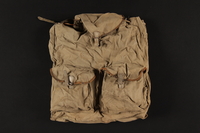
Khaki canvas knapsack brought to the US by a German Jewish refugee
Object
Canvas knapsack brought by Karl Weiler to the United States when he left Nazi Germany in December 1937. When Karl was at university, he had a collapsible kayak that fit into a knapsack that he used on his frequent excursions into the nearby mountains. Karl lost his position as an assistant judge in March 1933 as the new Nazi government purged the civil service of Jews and passed a law to that effect April 7 with the first Aryan only qualification clause. Karl rejoined the family agricultural firm in Brakel. Anti-Jewish pressures increased and, in May 1936, the firm’s board of directors was forced to sell the business at a loss to a Nazi approved buyer. In December 1937, Karl left for the US. After the war ended in May 1945, he learned that his parents, Fritz and Ella, had been deported to Theresienstadt ghetto-labor camp in 1942, then in 1944 to Auschwitz killing center where they were murdered. His sister, Mathilde Fodor, had been deported from Budapest, Hungary, in November 1944 to Lichtenworth concentration camp where she died of starvation. Her husband, Joszi, and their son, Karoly, survived.
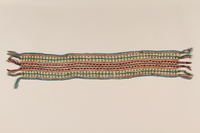
Multicolored woven wool scarf brought to the US by a German Jewish refugee
Object
Colorful woven wool scarf brought by Karl Weiler to the United States when he left Nazi Germany in December 1937. Karl lost his position as an assistant judge in March 1933 as the new Nazi government purged the civil service of Jews and passed a law to that effect April 7 with the first Aryan only qualification clause. Karl rejoined the family agricultural firm in Brakel. Anti-Jewish pressures increased and, in May 1936, the firm’s board of directors was forced to sell the business at a loss to a Nazi approved buyer. In December 1937, Karl left for the US. After the war ended in May 1945, he learned that his parents, Fritz and Ella, had been deported to Theresienstadt ghetto-labor camp in 1942, then in 1944 to Auschwitz killing center where they were murdered. His sister, Mathilde Fodor, had been deported from Budapest, Hungary, in November 1944 to Lichtenworth concentration camp where she died of starvation. Her husband, Joszi, and son, Karoly, survived.
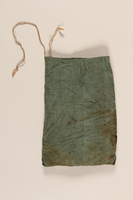
Green drawstring cloth pouch brought to the US by a German Jewish refugee
Object
Green drawstring pouch brought by Karl Weiler to the United States when he left Nazi Germany in December 1937. Karl lost his position as an assistant judge in March 1933 as the new Nazi government purged the civil service of Jews and passed a law to that effect April 7 with the first Aryan only qualification clause. Karl rejoined the family agricultural firm in Brakel. Anti-Jewish pressures increased and, in May 1936, the firm’s board of directors was forced to sell the business at a loss to a Nazi approved buyer. In December 1937, Karl left for the US. After the war ended in May 1945, he learned that his parents, Fritz and Ella, had been deported to Theresienstadt ghetto-labor camp in 1942, then in 1944 to Auschwitz killing center where they were murdered. His sister, Mathilde Fodor, had been deported from Budapest, Hungary, in November 1944 to Lichtenworth concentration camp where she died of starvation. Her husband, Joszi, and son, Karoly, survived.

Pair of khaki ski mittens used by a German Jewish emigre in the US
Object
Ski mittens used by Mina Weiler in the United States. Mina Kaufmann emigrated from Germany to the United States in 1938 and married Carl Weiler.
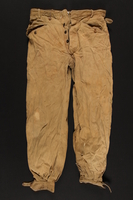
Brown knee length tapered pants brought to the US by a German Jewish refugee
Object
Brown knee length pants brought by Karl Weiler to the United States when he left Nazi Germany in December 1937. Karl lost his position as an assistant judge in March 1933 when the new Nazi government purged the civil service of Jews and passed a law to that effect April 7 with the first Aryan only qualification clause. Karl rejoined the family agricultural firm in Brakel. Anti-Jewish pressures increased and, in May 1936, the firm’s board of directors was forced to sell the business at a loss to a Nazi approved buyer. In December 1937, Karl left for the US. After the war ended in May 1945, he learned that his parents, Fritz and Ella, had been deported to Theresienstadt ghetto-labor camp in 1942, then in 1944 to Auschwitz killing center where they were murdered. His sister, Mathilde Fodor, had been deported from Budapest, Hungary, in November 1944 to Lichtenworth concentration camp where she died of starvation. Her husband, Joszi, and son, Karoly, survived.
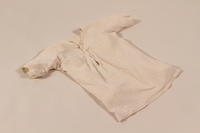
Short sleeved henley undershirt with 2 buttons brought to the US by a German Jewish refugee
Object
Short sleeved undershirt brought by Karl Weiler to the United States when he left Nazi Germany in December 1937. Karl lost his position as an assistant judge in March 1933 when the new Nazi government purged the civil service of Jews and passed a law to that effect April 7 with the first Aryan only qualification clause. Karl rejoined the family agricultural firm in Brakel. Anti-Jewish pressures increased and, in May 1936, the firm’s board of directors was forced to sell the business at a loss to a Nazi approved buyer. In December 1937, Karl left for the US. After the war ended in May 1945, he learned that his parents, Fritz and Ella, had been deported to Theresienstadt ghetto-labor camp in 1942, then in 1944 to Auschwitz killing center where they were murdered. His sister, Mathilde Fodor, had been deported from Budapest, Hungary, in November 1944 to Lichtenworth concentration camp where she died of starvation. Her husband, Joszi, and son, Karoly, survived.
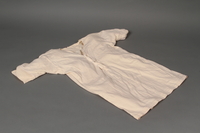
Short sleeved henley undershirt with 3 buttons brought to the US by a German Jewish refugee
Object
Short sleeved undershirt brought by Karl Weiler to the United States when he left Nazi Germany in December 1937. Karl lost his position as an assistant judge in March 1933 when the new Nazi government purged the civil service of Jews and passed a law to that effect April 7 with the first Aryan only qualification clause. Karl rejoined the family agricultural firm in Brakel. Anti-Jewish pressures increased and, in May 1936, the firm’s board of directors was forced to sell the business at a loss to a Nazi approved buyer. In December 1937, Karl left for the US. After the war ended in May 1945, he learned that his parents, Fritz and Ella, had been deported to Theresienstadt ghetto-labor camp in 1942, then in 1944 to Auschwitz killing center where they were murdered. His sister, Mathilde Fodor, had been deported from Budapest, Hungary, in November 1944 to Lichtenworth concentration camp where she died of starvation. Her husband, Joszi, and son, Karoly, survived.
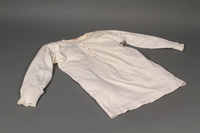
Long sleeved Henley undershirt brought to the US by a German Jewish refugee
Object
Long sleeved undershirt brought by Karl Weiler to the United States when he left Nazi Germany in December 1937. Karl lost his position as an assistant judge in March 1933 when the new Nazi government purged the civil service of Jews and passed a law to that effect April 7 with the first Aryan only qualification clause. Karl rejoined the family agricultural firm in Brakel. Anti-Jewish pressures increased and, in May 1936, the firm’s board of directors was forced to sell the business at a loss to a Nazi approved buyer. In December 1937, Karl left for the US. After the war ended in May 1945, he learned that his parents, Fritz and Ella, had been deported to Theresienstadt ghetto-labor camp in 1942, then in 1944 to Auschwitz killing center where they were murdered. His sister, Mathilde Fodor, had been deported from Budapest, Hungary, in November 1944 to Lichtenworth concentration camp where she died of starvation. Her husband, Joszi, and son, Karoly, survived.
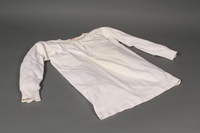
Long sleeved Henley undershirt with a name tag brought to the US by a German Jewish refugee
Object
Long sleeved undershirt brought by Karl Weiler to the United States when he left Nazi Germany in December 1937. It was originally owned by Karl’s father, Friedrich (Fritz) Weiler. Karl lost his position as an assistant judge in March 1933 when the new Nazi government purged the civil service of Jews and passed a law to that effect April 7 with the first Aryan only qualification clause. Karl rejoined the family agricultural firm in Brakel. Anti-Jewish pressures increased and, in May 1936, the firm’s board of directors was forced to sell the business at a loss to a Nazi approved buyer. In December 1937, Karl left for the US. After the war ended in May 1945, he learned that his parents, Fritz and Ella, had been deported to Theresienstadt ghetto-labor camp in 1942, then in 1944 to Auschwitz killing center where they were murdered. His sister, Mathilde Fodor, had been deported from Budapest, Hungary, in November 1944 to Lichtenworth concentration camp where she died of starvation. Her husband, Joszi, and son, Karoly, survived.
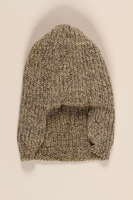
Black and white tweed patterned wool knit hat brought to the US by a German Jewish refugee
Object
Tweed wool ribbed knit hat brought by Karl Weiler to the United States when he left Nazi Germany in December 1937. Karl lost his position as an assistant judge in March 1933 when the new Nazi government purged the civil service of Jews and passed a law to that effect April 7 with the first Aryan only qualification clause. Karl rejoined the family agricultural firm in Brakel. Anti-Jewish pressures increased and, in May 1936, the firm’s board of directors was forced to sell the business at a loss to a Nazi approved buyer. In December 1937, Karl left for the US. After the war ended in May 1945, he learned that his parents, Fritz and Ella, had been deported to Theresienstadt ghetto-labor camp in 1942, then in 1944 to Auschwitz killing center where they were murdered. His sister, Mathilde Fodor, had been deported from Budapest, Hungary, in November 1944 to Lichtenworth concentration camp where she died of starvation. Her husband, Joszi, and son, Karoly, survived.
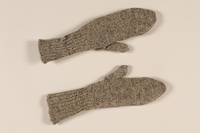
Pair of black and white tweed patterned wool knit mittens brought to the US by a German Jewish refugee
Object
Pair of wool knit mittens brought by Karl Weiler to the United States when he left Nazi Germany in December 1937. Karl lost his position as an assistant judge in March 1933 when the new Nazi government purged the civil service of Jews and passed a law to that effect April 7 with the first Aryan only qualification clause. Karl rejoined the family agricultural firm in Brakel. Anti-Jewish pressures increased and, in May 1936, the firm’s board of directors was forced to sell the business at a loss to a Nazi approved buyer. In December 1937, Karl left for the US. After the war ended in May 1945, he learned that his parents, Fritz and Ella, had been deported to Theresienstadt ghetto-labor camp in 1942, then in 1944 to Auschwitz killing center where they were murdered. His sister, Mathilde Fodor, had been deported from Budapest, Hungary, in November 1944 to Lichtenworth concentration camp where she died of starvation. Her husband, Joszi, and son, Karoly, survived.
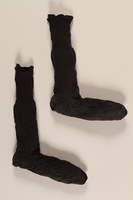
Pair of black cotton midcalf socks with a black name tag brought to the US by a German Jewish refugee
Object
Pair of black cotton socks brought by Karl Weiler to the United States when he left Nazi Germany in December 1937. Karl lost his position as an assistant judge in March 1933 when the new Nazi government purged the civil service of Jews and passed a law to that effect April 7 with the first Aryan only qualification clause. Karl rejoined the family agricultural firm in Brakel. Anti-Jewish pressures increased and, in May 1936, the firm’s board of directors was forced to sell the business at a loss to a Nazi approved buyer. In December 1937, Karl left for the US. After the war ended in May 1945, he learned that his parents, Fritz and Ella, had been deported to Theresienstadt ghetto-labor camp in 1942, then in 1944 to Auschwitz killing center where they were murdered. His sister, Mathilde Fodor, had been deported from Budapest, Hungary, in November 1944 to Lichtenworth concentration camp where she died of starvation. Her husband, Joszi, and son, Karoly, survived.
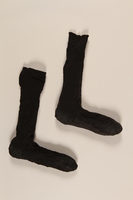
Pair of black cotton midcalf socks with a white name tag brought to the US by a German Jewish refugee
Object
Pair of black cotton socks brought by Karl Weiler to the United States when he left Nazi Germany in December 1937. Karl lost his position as an assistant judge in March 1933 when the new Nazi government purged the civil service of Jews and passed a law to that effect April 7 with the first Aryan only qualification clause. Karl rejoined the family agricultural firm in Brakel. Anti-Jewish pressures increased and, in May 1936, the firm’s board of directors was forced to sell the business at a loss to a Nazi approved buyer. In December 1937, Karl left for the US. After the war ended in May 1945, he learned that his parents, Fritz and Ella, had been deported to Theresienstadt ghetto-labor camp in 1942, then in 1944 to Auschwitz killing center where they were murdered. His sister, Mathilde Fodor, had been deported from Budapest, Hungary, in November 1944 to Lichtenworth concentration camp where she died of starvation. Her husband, Joszi, and son, Karoly, survived.
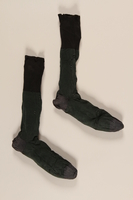
Pair of dark green cotton socks brought to the US by a German Jewish refugee
Object
Pair of dark green cotton socks brought by Karl Weiler to the United States when he left Nazi Germany in December 1937. The socks were originally owned by Karl’s father, Friedrich (Fritz) Weiler. Karl lost his position as an assistant judge in March 1933 when the new Nazi government purged the civil service of Jews and passed a law to that effect April 7 with the first Aryan only qualification clause. Karl rejoined the family agricultural firm in Brakel. Anti-Jewish pressures increased and, in May 1936, the firm’s board of directors was forced to sell the business at a loss to a Nazi approved buyer. In December 1937, Karl left for the US. After the war ended in May 1945, he learned that his parents, Fritz and Ella, had been deported to Theresienstadt ghetto-labor camp in 1942, then in 1944 to Auschwitz killing center where they were murdered. His sister, Mathilde Fodor, had been deported from Budapest, Hungary, in November 1944 to Lichtenworth concentration camp where she died of starvation. Her husband, Joszi, and son, Karoly, survived.
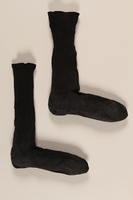
Pair of black cotton socks with a black name tag brought to the US by a German Jewish refugee
Object
Pair of black cotton socks brought by Karl Weiler to the United States when he left Nazi Germany in December 1937. Karl lost his position as an assistant judge in March 1933 when the new Nazi government purged the civil service of Jews and passed a law to that effect April 7 with the first Aryan only qualification clause. Karl rejoined the family agricultural firm in Brakel. Anti-Jewish pressures increased and, in May 1936, the firm’s board of directors was forced to sell the business at a loss to a Nazi approved buyer. In December 1937, Karl left for the US. After the war ended in May 1945, he learned that his parents, Fritz and Ella, had been deported to Theresienstadt ghetto-labor camp in 1942, then in 1944 to Auschwitz killing center where they were murdered. His sister, Mathilde Fodor, had been deported from Budapest, Hungary, in November 1944 to Lichtenworth concentration camp where she died of starvation. Her husband, Joszi, and son, Karoly, survived.
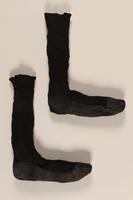
Pair of black cotton socks with a gray sole brought to the US by a German Jewish refugee
Object
Pair of black cotton socks brought by Karl Weiler to the United States when he left Nazi Germany in December 1937. Karl lost his position as an assistant judge in March 1933 when the new Nazi government purged the civil service of Jews and passed a law to that effect April 7 with the first Aryan only qualification clause. Karl rejoined the family agricultural firm in Brakel. Anti-Jewish pressures increased and, in May 1936, the firm’s board of directors was forced to sell the business at a loss to a Nazi approved buyer. In December 1937, Karl left for the US. After the war ended in May 1945, he learned that his parents, Fritz and Ella, had been deported to Theresienstadt ghetto-labor camp in 1942, then in 1944 to Auschwitz killing center where they were murdered. His sister, Mathilde Fodor, had been deported from Budapest, Hungary, in November 1944 to Lichtenworth concentration camp where she died of starvation. Her husband, Joszi, and son, Karoly, survived.
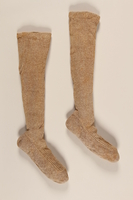
Pair of tan and white wool knit knee high socks brought to the US by a German Jewish refugee
Object
Pair of tan and white wool knit socks brought by Karl Weiler to the United States when he left Nazi Germany in December 1937. Karl lost his position as an assistant judge in March 1933 when the new Nazi government purged the civil service of Jews and passed a law to that effect April 7 with the first Aryan only qualification clause. Karl rejoined the family agricultural firm in Brakel. Anti-Jewish pressures increased and, in May 1936, the firm’s board of directors was forced to sell the business at a loss to a Nazi approved buyer. In December 1937, Karl left for the US. After the war ended in May 1945, he learned that his parents, Fritz and Ella, had been deported to Theresienstadt ghetto-labor camp in 1942, then in 1944 to Auschwitz killing center where they were murdered. His sister, Mathilde Fodor, had been deported from Budapest, Hungary, in November 1944 to Lichtenworth concentration camp where she died of starvation. Her husband, Joszi, and son, Karoly, survived.
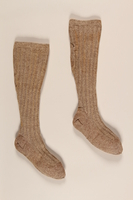
Pair of tan and white wool knit tweed patterned knee high socks brought to the US by a German Jewish refugee
Object
Pair of tan and white wool knit socks brought by Karl Weiler to the United States when he left Nazi Germany in December 1937. Karl lost his position as an assistant judge in March 1933 when the new Nazi government purged the civil service of Jews and passed a law to that effect April 7 with the first Aryan only qualification clause. Karl rejoined the family agricultural firm in Brakel. Anti-Jewish pressures increased and, in May 1936, the firm’s board of directors was forced to sell the business at a loss to a Nazi approved buyer. In December 1937, Karl left for the US. After the war ended in May 1945, he learned that his parents, Fritz and Ella, had been deported to Theresienstadt ghetto-labor camp in 1942, then in 1944 to Auschwitz killing center where they were murdered. His sister, Mathilde Fodor, had been deported from Budapest, Hungary, in November 1944 to Lichtenworth concentration camp where she died of starvation. Her husband, Joszi, and son, Karoly, survived.
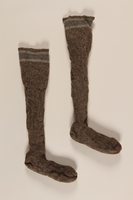
Pair of brown and white wool knit kneesocks brought to the US by a German Jewish refugee
Object
Pair of brown and white wool knit socks brought by Karl Weiler to the United States when he left Nazi Germany in December 1937. Karl lost his position as an assistant judge in March 1933 when the new Nazi government purged the civil service of Jews and passed a law to that effect April 7 with the first Aryan only qualification clause. Karl rejoined the family agricultural firm in Brakel. Anti-Jewish pressures increased and, in May 1936, the firm’s board of directors was forced to sell the business at a loss to a Nazi approved buyer. In December 1937, Karl left for the US. After the war ended in May 1945, he learned that his parents, Fritz and Ella, had been deported to Theresienstadt ghetto-labor camp in 1942, then in 1944 to Auschwitz killing center where they were murdered. His sister, Mathilde Fodor, had been deported from Budapest, Hungary, in November 1944 to Lichtenworth concentration camp where she died of starvation. Her husband, Joszi, and son, Karoly, survived.
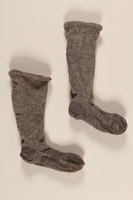
Pair of gray and white wool knit socks brought to the US by a German Jewish refugee
Object
Pair of gray and white wool knit socks brought by Karl Weiler to the United States when he left Nazi Germany in December 1937. Karl lost his position as an assistant judge in March 1933 when the new Nazi government purged the civil service of Jews and passed a law to that effect April 7 with the first Aryan only qualification clause. Karl rejoined the family agricultural firm in Brakel. Anti-Jewish pressures increased and, in May 1936, the firm’s board of directors was forced to sell the business at a loss to a Nazi approved buyer. In December 1937, Karl left for the US. After the war ended in May 1945, he learned that his parents, Fritz and Ella, had been deported to Theresienstadt ghetto-labor camp in 1942, then in 1944 to Auschwitz killing center where they were murdered. His sister, Mathilde Fodor, had been deported from Budapest, Hungary, in November 1944 to Lichtenworth concentration camp where she died of starvation. Her husband, Joszi, and son, Karoly, survived.
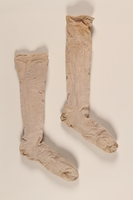
Pair of light brown cotton knee high socks brought to the US by a German Jewish refugee
Object
Pair of light brown cotton socks brought by Karl Weiler to the United States when he left Nazi Germany in December 1937. Karl lost his position as an assistant judge in March 1933 when the new Nazi government purged the civil service of Jews and passed a law to that effect April 7 with the first Aryan only qualification clause. Karl rejoined the family agricultural firm in Brakel. Anti-Jewish pressures increased and, in May 1936, the firm’s board of directors was forced to sell the business at a loss to a Nazi approved buyer. In December 1937, Karl left for the US. After the war ended in May 1945, he learned that his parents, Fritz and Ella, had been deported to Theresienstadt ghetto-labor camp in 1942, then in 1944 to Auschwitz killing center where they were murdered. His sister, Mathilde Fodor, had been deported from Budapest, Hungary, in November 1944 to Lichtenworth concentration camp where she died of starvation. Her husband, Joszi, and son, Karoly, survived.
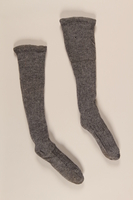
Pair of gray wool knit knee high ribbed socks brought to the US by a German Jewish refugee
Object
Pair of gray wool knit socks brought by Karl Weiler to the United States when he left Nazi Germany in December 1937. Karl lost his position as an assistant judge in March 1933 when the new Nazi government purged the civil service of Jews and passed a law to that effect April 7 with the first Aryan only qualification clause. Karl rejoined the family agricultural firm in Brakel. Anti-Jewish pressures increased and, in May 1936, the firm’s board of directors was forced to sell the business at a loss to a Nazi approved buyer. In December 1937, Karl left for the US. After the war ended in May 1945, he learned that his parents, Fritz and Ella, had been deported to Theresienstadt ghetto-labor camp in 1942, then in 1944 to Auschwitz killing center where they were murdered. His sister, Mathilde Fodor, had been deported from Budapest, Hungary, in November 1944 to Lichtenworth concentration camp where she died of starvation. Her husband, Joszi, and son, Karoly, survived.
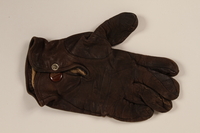
Brown Nappa leather left hand glove brought to the US by a German Jewish refugee
Object
Brown Nappa leather, left hand glove brought by Karl Weiler to the United States when he left Nazi Germany in December 1937. Karl lost his position as an assistant judge in March 1933 when the new Nazi government purged the civil service of Jews and passed a law to that effect April 7 with the first Aryan only qualification clause. Karl rejoined the family agricultural firm in Brakel. Anti-Jewish pressures increased and, in May 1936, the firm’s board of directors was forced to sell the business at a loss to a Nazi approved buyer. In December 1937, Karl left for the US. After the war ended in May 1945, he learned that his parents, Fritz and Ella, had been deported to Theresienstadt ghetto-labor camp in 1942, then in 1944 to Auschwitz killing center where they were murdered. His sister, Mathilde Fodor, had been deported from Budapest, Hungary, in November 1944 to Lichtenworth concentration camp where she died of starvation. Her husband, Joszi, and son, Karoly, survived.
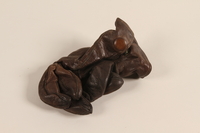
Dark brown leather left hand glove brought to the US by a German Jewish refugee
Object
Dark brown leather, left hand glove brought by Karl Weiler to the United States when he left Nazi Germany in December 1937. Karl lost his position as an assistant judge in March 1933 when the new Nazi government purged the civil service of Jews and passed a law to that effect April 7 with the first Aryan only qualification clause. Karl rejoined the family agricultural firm in Brakel. Anti-Jewish pressures increased and, in May 1936, the firm’s board of directors was forced to sell the business at a loss to a Nazi approved buyer. In December 1937, Karl left for the US. After the war ended in May 1945, he learned that his parents, Fritz and Ella, had been deported to Theresienstadt ghetto-labor camp in 1942, then in 1944 to Auschwitz killing center where they were murdered. His sister, Mathilde Fodor, had been deported from Budapest, Hungary, in November 1944 to Lichtenworth concentration camp where she died of starvation. Her husband, Joszi, and son, Karoly, survived.
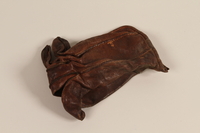
Brown leather right hand glove brought to the US by a German Jewish refugee
Object
Brown leather, right hand glove brought by Karl Weiler to the United States when he left Nazi Germany in December 1937. Karl lost his position as an assistant judge in March 1933 when the new Nazi government purged the civil service of Jews and passed a law to that effect April 7 with the first Aryan only qualification clause. Karl rejoined the family agricultural firm in Brakel. Anti-Jewish pressures increased and, in May 1936, the firm’s board of directors was forced to sell the business at a loss to a Nazi approved buyer. In December 1937, Karl left for the US. After the war ended in May 1945, he learned that his parents, Fritz and Ella, had been deported to Theresienstadt ghetto-labor camp in 1942, then in 1944 to Auschwitz killing center where they were murdered. His sister, Mathilde Fodor, had been deported from Budapest, Hungary, in November 1944 to Lichtenworth concentration camp where she died of starvation. Her husband, Joszi, and son, Karoly, survived.
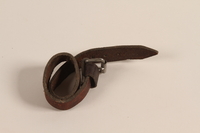
Leather runaway ski strap brought to the US by a German Jewish refugee
Object
Leather runaway ski strap glove brought by Karl Weiler to the United States when he left Nazi Germany in December 1937. The strap prevents a ski from being lost if the binding released. Karl lost his position as an assistant judge in March 1933 when the new Nazi government purged the civil service of Jews and passed a law to that effect April 7 with the first Aryan only qualification clause. Karl rejoined the family agricultural firm in Brakel. Anti-Jewish pressures increased and, in May 1936, the firm’s board of directors was forced to sell the business at a loss to a Nazi approved buyer. In December 1937, Karl left for the US. After the war ended in May 1945, he learned that his parents, Fritz and Ella, had been deported to Theresienstadt ghetto-labor camp in 1942, then in 1944 to Auschwitz killing center where they were murdered. His sister, Mathilde Fodor, had been deported from Budapest, Hungary, in November 1944 to Lichtenworth concentration camp where she died of starvation. Her husband, Joszi, and son, Karoly, survived.
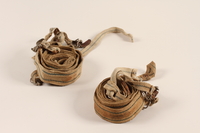
Set of goatskin cross country ski straps brought to the US by a German Jewish refugee
Object
Pair of goatskin ski straps brought by Karl Weiler to the United States when he left Nazi Germany in December 1937. The straps are placed on the bottom of skis to increase friction while cross-country skiing uphill. Karl lost his position as an assistant judge in March 1933 when the new Nazi government purged the civil service of Jews and passed a law to that effect April 7 with the first Aryan only qualification clause. Karl rejoined the family agricultural firm in Brakel. Anti-Jewish pressures increased and, in May 1936, the firm’s board of directors was forced to sell the business at a loss to a Nazi approved buyer. In December 1937, Karl left for the US. After the war ended in May 1945, he learned that his parents, Fritz and Ella, had been deported to Theresienstadt ghetto-labor camp in 1942, then in 1944 to Auschwitz killing center where they were murdered. His sister, Mathilde Fodor, had been deported from Budapest, Hungary, in November 1944 to Lichtenworth concentration camp where she died of starvation. Her husband, Joszi, and son, Karoly, survived.
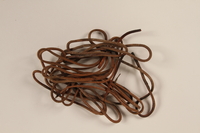
Four leather shoelaces brought to the US by a German Jewish refugee
Object
Four leather shoelaces brought by Karl Weiler from Nazi Germany to the United States in December 1937. Karl lost his position as an assistant judge in March 1933 when the new Nazi government purged the civil service of Jews and passed a law to that effect April 7 with the first Aryan only qualification clause. Karl rejoined the family agricultural firm in Brakel. Anti-Jewish pressures increased and, in May 1936, the firm’s board of directors was forced to sell the business at a loss to a Nazi approved buyer. In December 1937, Karl left for the US. After the war ended in May 1945, he learned that his parents, Fritz and Ella, had been deported to Theresienstadt ghetto-labor camp in 1942, then in 1944 to Auschwitz killing center where they were murdered. His sister, Mathilde Fodor, had been deported from Budapest, Hungary, in November 1944 to Lichtenworth concentration camp where she died of starvation. Her husband, Joszi, and son, Karoly, survived.
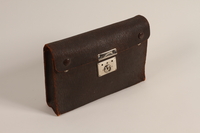
Small dark brown leather briefcase used by a German Jewish refugee
Object
Small dark brown leather briefcase brought by Karl Weiler from Nazi Germany to the United States in December 1937. Karl lost his position as an assistant judge in March 1933 when the new Nazi government purged the civil service of Jews and passed a law to that effect April 7 with the first Aryan only qualification clause. Karl rejoined the family agricultural firm in Brakel. Anti-Jewish pressures increased and, in May 1936, the firm’s board of directors was forced to sell the business at a loss to a Nazi approved buyer. In December 1937, Karl left for the US. After the war ended in May 1945, he learned that his parents, Fritz and Ella, had been deported to Theresienstadt ghetto-labor camp in 1942, then in 1944 to Auschwitz killing center where they were murdered. His sister, Mathilde Fodor, had been deported from Budapest, Hungary, in November 1944 to Lichtenworth concentration camp where she died of starvation. Her husband, Joszi, and son, Karoly, survived.
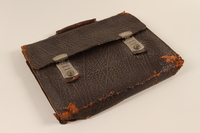
Dark brown leather briefcase used by a German Jewish refugee
Object
Dark brown leather briefcase brought by Karl Weiler from Nazi Germany to the United States in December 1937. Karl lost his position as an assistant judge in March 1933 when the new Nazi government purged the civil service of Jews and passed a law to that effect April 7 with the first Aryan only qualification clause. Karl rejoined the family agricultural firm in Brakel. Anti-Jewish pressures increased and, in May 1936, the firm’s board of directors was forced to sell the business at a loss to a Nazi approved buyer. In December 1937, Karl left for the US. After the war ended in May 1945, he learned that his parents, Fritz and Ella, had been deported to Theresienstadt ghetto-labor camp in 1942, then in 1944 to Auschwitz killing center where they were murdered. His sister, Mathilde Fodor, had been deported from Budapest, Hungary, in November 1944 to Lichtenworth concentration camp where she died of starvation. Her husband, Joszi, and son, Karoly, survived.
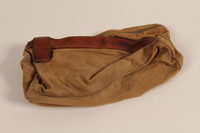
Small zippered pouch with leather trim brought to the US by a German Jewish refugee
Object
Small canvas travel bag brought by Karl Weiler from Nazi Germany to the United States in December 1937. Karl lost his position as an assistant judge in March 1933 when the new Nazi government purged the civil service of Jews and passed a law to that effect April 7 with the first Aryan only qualification clause. Karl rejoined the family agricultural firm in Brakel. Anti-Jewish pressures increased and, in May 1936, the firm’s board of directors was forced to sell the business at a loss to a Nazi approved buyer. In December 1937, Karl left for the US. After the war ended in May 1945, he learned that his parents, Fritz and Ella, had been deported to Theresienstadt ghetto-labor camp in 1942, then in 1944 to Auschwitz killing center where they were murdered. His sister, Mathilde Fodor, had been deported from Budapest, Hungary, in November 1944 to Lichtenworth concentration camp where she died of starvation. Her husband, Joszi, and son, Karoly, survived.
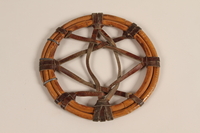
Ski pole basket with narrowleather straps brought to the US by a German Jewish refugee
Object
Ski pole basket brought by Karl Weiler from Nazi Germany to the United States in December 1937. The basket attaches near the end of a ski pole to prevent the pole from falling into deep snow. Karl lost his position as an assistant judge in March 1933 when the new Nazi government purged the civil service of Jews and passed a law to that effect April 7 with the first Aryan only qualification clause. Karl rejoined the family agricultural firm in Brakel. Anti-Jewish pressures increased and, in May 1936, the firm’s board of directors was forced to sell the business at a loss to a Nazi approved buyer. In December 1937, Karl left for the US. After the war ended in May 1945, he learned that his parents, Fritz and Ella, had been deported to Theresienstadt ghetto-labor camp in 1942, then in 1944 to Auschwitz killing center where they were murdered. His sister, Mathilde Fodor, had been deported from Budapest, Hungary, in November 1944 to Lichtenworth concentration camp where she died of starvation. Her husband, Joszi, and son, Karoly, survived.
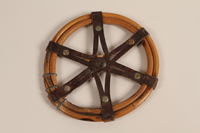
Ski pole basket with wide leather straps brought to the US by a German Jewish refugee
Object
Ski pole basket brought by Karl Weiler from Nazi Germany to the United States in December 1937. The basket attaches near the end of a ski pole to prevent the pole from falling into deep snow. Karl lost his position as an assistant judge in March 1933 when the new Nazi government purged the civil service of Jews and passed a law to that effect April 7 with the first Aryan only qualification clause. Karl rejoined the family agricultural firm in Brakel. Anti-Jewish pressures increased and, in May 1936, the firm’s board of directors was forced to sell the business at a loss to a Nazi approved buyer. In December 1937, Karl left for the US. After the war ended in May 1945, he learned that his parents, Fritz and Ella, had been deported to Theresienstadt ghetto-labor camp in 1942, then in 1944 to Auschwitz killing center where they were murdered. His sister, Mathilde Fodor, had been deported from Budapest, Hungary, in November 1944 to Lichtenworth concentration camp where she died of starvation. Her husband, Joszi, and son, Karoly, survived.
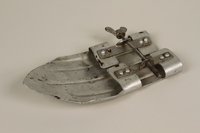
Metal ski foot attachment brought to the US by a German Jewish refugee
Object
Metal ski tip attachment brought by Karl Weiler from Nazi Germany to the United States in December 1937. Karl lost his position as an assistant judge in March 1933 when the new Nazi government purged the civil service of Jews and passed a law to that effect April 7 with the first Aryan only qualification clause. Karl rejoined the family agricultural firm in Brakel. Anti-Jewish pressures increased and, in May 1936, the firm’s board of directors was forced to sell the business at a loss to a Nazi approved buyer. In December 1937, Karl left for the US. After the war ended in May 1945, he learned that his parents, Fritz and Ella, had been deported to Theresienstadt ghetto-labor camp in 1942, then in 1944 to Auschwitz killing center where they were murdered. His sister, Mathilde Fodor, had been deported from Budapest, Hungary, in November 1944 to Lichtenworth concentration camp where she died of starvation. Her husband, Joszi, and son, Karoly, survived.
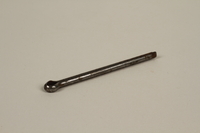
Extended prong cotter pin brought to the US by a German Jewish refugee
Object
Extended prong cotter pin brought by Karl Weiler from Nazi Germany to the United States in December 1937. Karl lost his position as an assistant judge in March 1933 when the new Nazi government purged the civil service of Jews and passed a law to that effect April 7 with the first Aryan only qualification clause. Karl rejoined the family agricultural firm in Brakel. Anti-Jewish pressures increased and, in May 1936, the firm’s board of directors was forced to sell the business at a loss to a Nazi approved buyer. In December 1937, Karl left for the US. After the war ended in May 1945, he learned that his parents, Fritz and Ella, had been deported to Theresienstadt ghetto-labor camp in 1942, then in 1944 to Auschwitz killing center where they were murdered. His sister, Mathilde Fodor, had been deported from Budapest, Hungary, in November 1944 to Lichtenworth concentration camp where she died of starvation. Her husband, Joszi, and son, Karoly, survived.
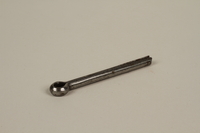
Cotter pin brought to the US by a German Jewish refugee
Object
Cotter pin brought by Karl Weiler from Nazi Germany to the United States in December 1937. Karl lost his position as an assistant judge in March 1933 when the new Nazi government purged the civil service of Jews and passed a law to that effect April 7 with the first Aryan only qualification clause. Karl rejoined the family agricultural firm in Brakel. Anti-Jewish pressures increased and, in May 1936, the firm’s board of directors was forced to sell the business at a loss to a Nazi approved buyer. In December 1937, Karl left for the US. After the war ended in May 1945, he learned that his parents, Fritz and Ella, had been deported to Theresienstadt ghetto-labor camp in 1942, then in 1944 to Auschwitz killing center where they were murdered. His sister, Mathilde Fodor, had been deported from Budapest, Hungary, in November 1944 to Lichtenworth concentration camp where she died of starvation. Her husband, Joszi, and son, Karoly, survived.
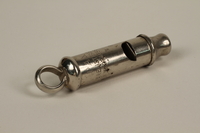
Pea whistle brought to the US by a German Jewish refugee
Object
Pea whistle brought by Karl Weiler from Nazi Germany to the United States in December 1937. Karl lost his position as an assistant judge in March 1933 when the new Nazi government purged the civil service of Jews and passed a law to that effect April 7 with the first Aryan only qualification clause. Karl rejoined the family agricultural firm in Brakel. Anti-Jewish pressures increased and, in May 1936, the firm’s board of directors was forced to sell the business at a loss to a Nazi approved buyer. In December 1937, Karl left for the US. After the war ended in May 1945, he learned that his parents, Fritz and Ella, had been deported to Theresienstadt ghetto-labor camp in 1942, then in 1944 to Auschwitz killing center where they were murdered. His sister, Mathilde Fodor, had been deported from Budapest, Hungary, in November 1944 to Lichtenworth concentration camp where she died of starvation. Her husband, Joszi, and son, Karoly, survived.
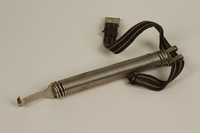
Pair of Amstutz spring ski bindings with cloth straps brought to the US by a German Jewish refugee
Object
Pair of Amstutz spring ski bindings brought by Karl Weiler from Nazi Germany to the United States in December 1937. The springs are used for downhill skiing and secure the heel to the ski. Karl lost his position as an assistant judge in March 1933 when the new Nazi government purged the civil service of Jews and passed a law to that effect April 7 with the first Aryan only qualification clause. Karl rejoined the family agricultural firm in Brakel. Anti-Jewish pressures increased and, in May 1936, the firm’s board of directors was forced to sell the business at a loss to a Nazi approved buyer. In December 1937, Karl left for the US. After the war ended in May 1945, he learned that his parents, Fritz and Ella, had been deported to Theresienstadt ghetto-labor camp in 1942, then in 1944 to Auschwitz killing center where they were murdered. His sister, Mathilde Fodor, had been deported from Budapest, Hungary, in November 1944 to Lichtenworth concentration camp where she died of starvation. Her husband, Joszi, and son, Karoly, survived.
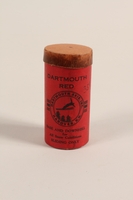
Dartmouth Red ski wax owned by a German Jewish refugee
Object
Round bar of ski wax owned by Carl Weiler after he emigrated to the United States from Nazi Germany in December 1937. Karl lost his position as an assistant judge in March 1933 when the new Nazi government purged the civil service of Jews and passed a law to that effect April 7 with the first Aryan only qualification clause. Karl rejoined the family agricultural firm in Brakel. Anti-Jewish pressures increased and, in May 1936, the firm’s board of directors was forced to sell the business at a loss to a Nazi approved buyer. In December 1937, Karl left for the US. After the war ended in May 1945, he learned that his parents, Fritz and Ella, had been deported to Theresienstadt ghetto-labor camp in 1942, then in 1944 to Auschwitz killing center where they were murdered. His sister, Mathilde Fodor, had been deported from Budapest, Hungary, in November 1944 to Lichtenworth concentration camp where she died of starvation. Her husband, Joszi, and son, Karoly, survived.
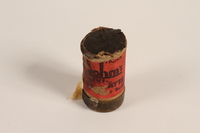
Red container of used ski wax brought to the US by a German Jewish refugee
Object
Ski wax brought by Karl Weiler to the United States when he left Nazi Germany in December 1937. Karl lost his position as an assistant judge in March 1933 when the new Nazi government purged the civil service of Jews and passed a law to that effect April 7 with the first Aryan only qualification clause. Karl rejoined the family agricultural firm in Brakel. Anti-Jewish pressures increased and, in May 1936, the firm’s board of directors was forced to sell the business at a loss to a Nazi approved buyer. In December 1937, Karl left for the US. After the war ended in May 1945, he learned that his parents, Fritz and Ella, had been deported to Theresienstadt ghetto-labor camp in 1942, then in 1944 to Auschwitz killing center where they were murdered. His sister, Mathilde Fodor, had been deported from Budapest, Hungary, in November 1944 to Lichtenworth concentration camp where she died of starvation. Her husband, Joszi, and son, Karoly, survived.
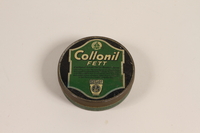
Used Collonil leather oil brought to the US by a German Jewish refugee
Object
Container of Collonil leather oil brought by Karl Weiler to the United States when he left Nazi Germany in December 1937. Karl lost his position as an assistant judge in Berlin in March 1933 when the new Nazi government purged the civil service of Jews. Karl rejoined the family agricultural firm in Brakel, Germany. Anti-Jewish pressures increased and, in May 1936, the firm’s board of directors was forced to sell the business at a loss to a Nazi approved buyer. In December 1937, Karl left for the US. After the war ended in May 1945, he learned that his parents, Fritz and Ella, had been deported to Theresienstadt ghetto-labor camp in German-occupied Czechoslovakia in 1942. Then in 1944 they were deported to Auschwitz killing center where they were murdered. His sister, Mathilde Fodor, had been deported from Budapest, Hungary in November 1944 to Lichtenworth concentration camp, where she died of starvation. Her husband, Joszi, and son, Karoly, survived.
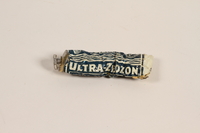
Blue and white tube of sunscreen brought to the US by a German Jewish refugee
Object
Tube of used sunscreen brought by Karl Weiler to the United States when he left Nazi Germany in December 1937. Karl lost his position as an assistant judge in March 1933 when the new Nazi government purged the civil service of Jews and passed a law to that effect April 7 with the first Aryan only qualification clause. Karl rejoined the family agricultural firm in Brakel. Anti-Jewish pressures increased and, in May 1936, the firm’s board of directors was forced to sell the business at a loss to a Nazi approved buyer. In December 1937, Karl left for the US. After the war ended in May 1945, he learned that his parents, Fritz and Ella, had been deported to Theresienstadt ghetto-labor camp in 1942, then in 1944 to Auschwitz killing center where they were murdered. His sister, Mathilde Fodor, had been deported from Budapest, Hungary, in November 1944 to Lichtenworth concentration camp where she died of starvation. Her husband, Joszi, and son, Karoly, survived.
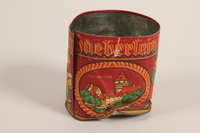
Haeberlein-Metzger almond lebkuchen red lidded tin brought to the US by a German Jewish refugee
Object
Nuremberg lebkuchen red tin with lid by Haeberlein-Metzger brought by Karl Weiler to the United States when he left Nazi Germany in December 1937. Lebkuchen is a cookie similar to gingerbread and only lebkuchen produced in Nuremberg can bear the city name. Karl lost his position as an assistant judge in March 1933 when the new Nazi government purged the civil service of Jews and passed a law to that effect April 7 with the first Aryan only qualification clause. Karl rejoined the family agricultural firm in Brakel. Anti-Jewish pressures increased and, in May 1936, the firm’s board of directors was forced to sell the business at a loss to a Nazi approved buyer. In December 1937, Karl left for the US. After the war ended in May 1945, he learned that his parents, Fritz and Ella, had been deported to Theresienstadt ghetto-labor camp in 1942, then in 1944 to Auschwitz killing center where they were murdered. His sister, Mathilde Fodor, had been deported from Budapest, Hungary, in November 1944 to Lichtenworth concentration camp where she died of starvation. Her husband, Joszi, and son, Karoly, survived.
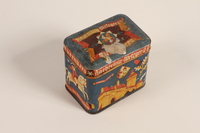
Haeberlein-Metzger lebkuchen blue decorative tin brought to the US by a German Jewish refugee
Object
Nuremberg lebkuchen blue painted tin by Haeberlein-Metzger brought by Karl Weiler to the United States when he left Nazi Germany in December 1937. Lebkuchen is a cookie similar to gingerbread and only lebkuchen produced in Nuremberg can bear the city name. Karl lost his position as an assistant judge in March 1933 when the new Nazi government purged the civil service of Jews and passed a law to that effect April 7 with the first Aryan only qualification clause. Karl rejoined the family agricultural firm in Brakel. Anti-Jewish pressures increased and, in May 1936, the firm’s board of directors was forced to sell the business at a loss to a Nazi approved buyer. In December 1937, Karl left for the US. After the war ended in May 1945, he learned that his parents, Fritz and Ella, had been deported to Theresienstadt ghetto-labor camp in 1942, then in 1944 to Auschwitz killing center where they were murdered. His sister, Mathilde Fodor, had been deported from Budapest, Hungary, in November 1944 to Lichtenworth concentration camp where she died of starvation. Her husband, Joszi, and son, Karoly, survived.
Book
Object
Book
Object
Book
Object



